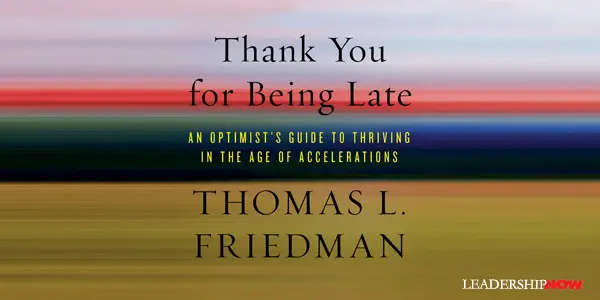 |
 |
03.03.17

Thank You for Being Late
As he notes, it more than just change it is reshaping that is taking place. It’s hard for any of us to keep up. “In such a time, opting to pause and reflect, rather than panic or withdraw, is a necessity. It is not a luxury or a distraction—it is a way to increase the odds that you’ll better understand, and engage productively with, the world around you.” Friedman’s title, Thank You for Being Late, comes from realizing that a guest’s tardiness to a meeting gave him time to just sit and think. And he was better for it. So, “Thank you for being late.” Thank You for Being Late succeeds in presenting a better understanding of why the world is the way it is. What follows is a small selection of thoughts and analysis of and prescriptions for the world we live in: ☙ As the world becomes more interdependent and complex, it becomes more vital than ever to widen your aperture and to synthesize more perspectives. ☙ Creativity becomes, in part, about asking the best questions. ☙ You can’t just show up. You need a plan to succeed. You have to know more, you have to update what you know more often, and you have to do more creative things with it. Self-motivation is now so much more important. ☙ It is so easy to forget that many, many people in America don’t have a professional network, an alumni network, two parents, or in some cases anyone around them with a job, to consult about how to get one. ☙ In a world of so many choices, it’s hard to know what to do. ☙ Social media is good for collective sharing, but not always so great for collective building; good for collective destruction, but maybe not so good for collective construction; fantastic for generating a flash mob, but not so good at generating a flash consensus on a party platform or a constitution. ☙ Quoting Jeffrey Garten, the former dean of the Yale School of Management: Maybe this is overly romantic, but I think leadership is going to require the ability to come to grips with values and ethics. The more technological we get, the more we need people who have a much broader framework. You’ll be able to hire the technologist to make systems work, but in terms of the goals, that takes a different kind of leader. ☙ A number of technological forces came together to create an exponential step in change in the power of men and machines—much faster than we have been able to reshape our institutions, our laws, and our modes of leadership. Quoting Dov Seidman: Technology creates possibilities for new behaviors and experiences and connection, but it takes human beings to make the behaviors principled, the experiences meaningful and the connections deeper and rooted in shared values and aspirations. ☙ No better source of restraint then a strong community. ☙ It is only when people relax their hearts and their minds that they are open to hear and engage with others, and healthy communities create a context for that. 
Posted by Michael McKinney at 11:07 AM
|
BUILD YOUR KNOWLEDGE
 

How to Do Your Start-Up Right STRAIGHT TALK FOR START-UPS 
Grow Your Leadership Skills NEW AND UPCOMING LEADERSHIP BOOKS 
Leadership Minute BITE-SIZE CONCEPTS YOU CAN CHEW ON 
Classic Leadership Books BOOKS TO READ BEFORE YOU LEAD |